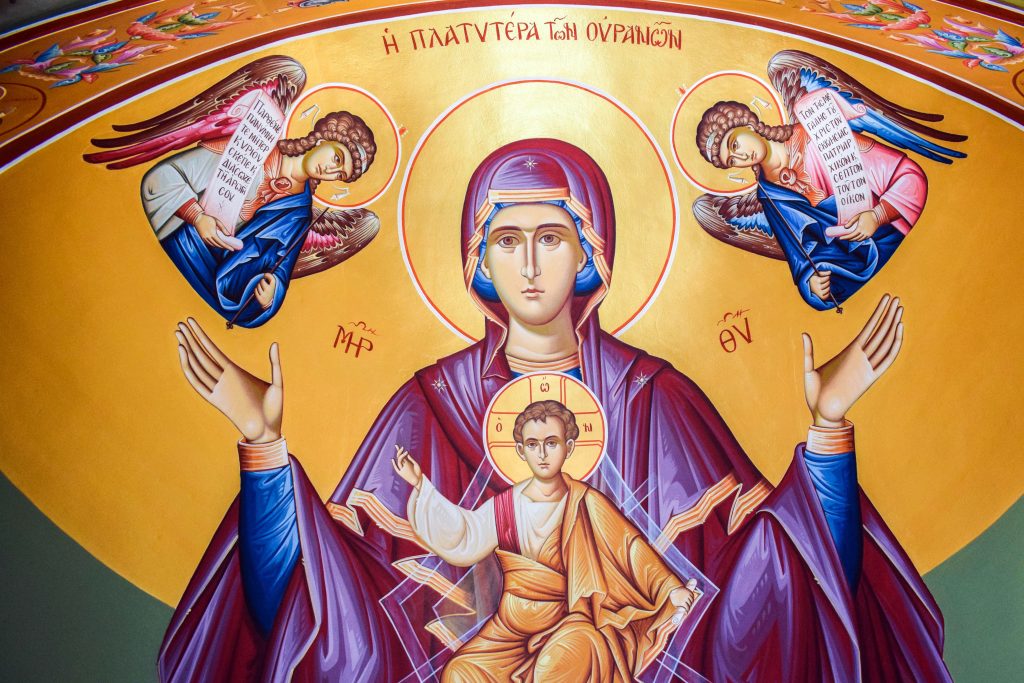
By Joel Hodge
This month, The eRecord commemorates the work of Women in the Church, in honour of the Virgin Mary.
Joel Hodge has this month written about the Virgin Mary and the role of mothers in Archdiocese of Melbourne publication, Melbourne Catholic.
I am in awe of mothers.
The responsibilities they hold, the tasks they accomplish and the difficulties they face—all amidst the care, concern, insecurity and pain they feel—are extraordinary. Humans are set one of their greatest tasks in rearing children, and the mother’s loving bond and role with children is particularly special and distinctive.
There are many different types of mothers, with different personalities, experiences, skills and effects. All of these aspects are redefined and tested with children.
There are also different ways that motherhood is viewed across time and cultures.
One mother, of course, holds an honoured place in the Christian tradition—Mary. Why is she special?
Fundamentally, because Mary combines a fidelity to God in her humanity, expressed as a mother.
Of course, motherhood requires a deep fidelity—to one’s family, spouse and children. A mother’s faithfulness is the glue that helps to hold the family together and maintains perseverance through good and bad.
This fidelity, for the Christian family, is built on love. It must be so if family life is to be lived out holistically and joyously, otherwise families split (often for good reasons, especially if violence or abuse is involved).
In the same way, humanity requires a deep fidelity—to ourselves, each other and our Creator. Faith and trust are the glue that allows our lives and society to function and for us to maintain our purpose in life.
For Christians, this fidelity ultimately requires the absolute and eternal love of God if it is to realise its deepest and most self-sacrificial form.
This combination of Christian faith and love is present in the life and motherhood of Mary, seen in the light of Christ. Theologian Drasko Dizdar puts it like this:
Mary is the iconic embodiment of our simple created humanity as God always intended it to be. And everything that we say of Mary is, then, a kind of Christian anthropology, a way of thinking about what it means to be simply human. The feast of the Theokotos (Mother of God) is a celebration of our greatest vocation and most sublime act: incarnating God. This feast of the Mother of God celebrates what our faith realises: humanity was always intended for divinity. And just as Mary embodies that intentionality, so Christ embodies and realises that destiny: she is what we are at our best; he is what we are becoming beyond any best of our own. She is simply human; he is fully human.
‘Simple humanity’ is what God chooses to bear God into the world that the world itself may be transubstantiated into the real presence of God, when God becomes all in all, and we become one-with-God through Christ, who is God-with-us. This is the ‘New’ year that opens the womb of time giving birth to eternity. Humanity is its mother; God is its father; Christ, our True Self, is its name.
In other words, Mary is what we were and are meant to be: carriers of God, who is incarnated in us. Mary is the exemplar of this truly human vocation because she actually carries God incarnate as a real human person, Jesus. In contrast to humanity before her, Mary holds nothing back from God (in other words, she is not separated from God by sin).
To actually do this requires complete openness to God. To allow God into our lives, and actually into one’s womb, requires full acceptance, which is expressed in Mary’s words to the angel: ‘Here am I, the servant of the Lord; let it be with me according to your word’ (Luke 1:35). These words, from St Luke’s Gospel, form the biblical foundation for the historic veneration of Mary.
They succinctly and beautifully express what God had always sought: the openness of humanity that would allow God to be one with them, so they could be one with God through Christ.
Mary does what we were always meant to do, so that God could bring us into God’s life.
This openness on the part of Mary is not just a momentary acceptance but the expression of her whole way of being: constant and perpetual openness to God that is carried into the rearing and ministry of Christ.
Mary’s openness was not something she accomplished on her own, but was enabled with God’s help and grace. It is this same grace that we are given at baptism, to be freed from the original sin that separates us from God and to be open to receive God’s love that will make us into bearers of Christ, like Mary. In this view, Mary is not worshipped, but always points back to Christ as the saviour.
Motherhood images the Christian vocation: motherhood involves openness to life that allows one to be taken up into a new way of living, in a family. Being Christian is openness to the source and substance of life—the mystery of God—which takes us up into a new way of living and absolute love in a new family, the Church.
In honouring Mary and praying to her, we are reminded of what humanity is called to: openness to God, which allows us to be taken up into God’s life of love through Christ.
In honouring her motherhood, we are reminded of how Mary expressed this calling (and continues to do so) as fully open to and cooperative with God’s love. Mary and the saints remind us of how we should live—receptive of God—and become living bearers of Christ in the world.